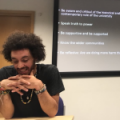A satellite event for the 2018 Battle of Ideas*
Identity politics is an ever-present and increasingly contentious feature of contemporary Western public life. Categories of race, gender, sexuality, religion and culture have become central to how individuals define themselves, and how we express solidarity in the fight for a just and tolerant society.
University campuses are perhaps the most visible sites where identity politics has come to the fore. However, the phenomenon goes way beyond student politics. Facebook now has a policy of offering over 70 genders to choose from, pop stars are regularly accused of cultural appropriation for fashion choices. There are also more serious concerns about a celebration of ‘white identity’ by the far-right in the US, or the reemergence of nationalism in some European countries.
Identity is important – both personally, in providing a sense of ourselves, and politically, as part of historic struggles for civil rights and equality. In fact, some argue that all politics is essentially identity politics, and anyone seen to be rejecting it is threatening to ‘minimise or ignore’ the plight of disadvantaged groups.
However, others disagree, arguing that there is a distinction between past struggles which used a collective sense of identity and the contemporary promotion of multiple, overlapping identities. Some point out that today’s identity politics is intolerant to a diversity of views on particular cultural issues, rather than seeking to achieve equality for all.
So, what’s the problem with identity politics? Is it just a continuation of past struggles against inequality and oppression? Or does contemporary identity politics actually threaten the very principles of solidarity and tolerance it claims to seek?




